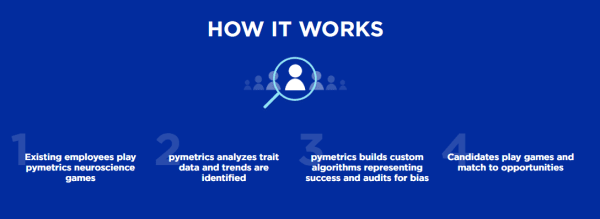How AI startup Pymetrics wants to make hiring bias free

While it is every company’s dream to build a more diverse workforce by carefully detecting and removing bias from their selection process, it is easier said than done. The traditional methods of recruitment are hardly bias-free and leave much to be desired when it comes to promoting diversity. Can AI come to the respite of organizations to make hiring bias-free?
One AI-based HR tech startup called Pymetrics thinks so. Pymetrics believes that the employment selection process should be a positive and un-biased experience for everyone and this guides the work it does. The data-driven company, founded by MIT alumnus Frida Polli and Julie Yoo in 2013, utilizes neuroscience and AI help global clients like Unilever, Accenture and LinkedIn make their hiring and internal mobility more predictive and less biased.
Where self-assessment tools, such as Myers Briggs and others, can be long, cumbersome, and out-dated, Pymetrics breaks this pattern by offering engaging online games that are quick and easy to play and let the test taker forget that they are even being assessed on their personality traits.
More so, this hiring process aims to create a fair, enjoyable, trustworthy, and worthwhile experience for candidates, providing them with immediate feedback on their trait profile and affording them the opportunity of a bias free, fair selection process. In an exclusive interview, Grace Kerrison, Managing Director, Asia Pacific & Vice-President Global Accounts at Pymetrics, sheds light on how the HR Tech startup wants to use AI to make the world of work fair.
How exactly does Pymetrics use gaming to find the right fit for a company while leveling the playing field for every candidate?
Pymetrics replaces the resume as a first-pass filter by assessing candidates based on their true potential -- their inherent cognitive, social and emotional make-up. We utilize state-of-the-art data science techniques often used to recommend movies (Netflix), products (Amazon) and music (Pandora). Pymetrics builds custom models for client companies, specific to each job opening. Based on these proprietary matching algorithms we recommend candidates for jobs.
Job seekers play Pymetrics neuroscience-based games and a job fit score for each individual is calculated by running the individual’s game data through the job model custom-built for the client company.
Our company-specific models utilize data that is trained on high-performing employees at a company. When companies look to build a custom model for a job function within their firm, they provide us with performance data on incumbents within that job function. The selected incumbents then play our games, and a trait profile is generated for each incumbent. To build the company- and job-specific model, we compare the aggregate trait profiles of ‘high performing’ incumbents against the aggregate trait profiles of a set of demographically matched professionals from our database. Total sample size usually ranges from hundreds to thousands of people. Data collection and performance ratings are all done anonymously using random IDs.

In addition, Pymetrics games can also be integrated directly into a company’s careers marketplace to help existing employees find their next role within the same organization. Incorporating such a system reduces knowledge and cultural loss by facilitating internal mobility within companies.
One thing that sets Pymetrics apart is that our algorithms are audited to remove any gender, ethnic or socio-economic bias.
Dwelling on that further, how does Pymetrics remove the bias in recruiting? Tell us more how Pymetrics is achieving its goal of “making the world a fairer place” by dismantling hiring discrimination like sexism, racism, ageism and classism?
In the Pymetrics methodology behavioral traits extracted from the games are examined for their potential to cause gender and racial/ethnic bias using statistical methods. Specifically, we look at each individual trait to determine whether it is related to prohibited demographics in the local validation sample for each client and then remove or de-weight that trait if such evidence emerges.
We de-bias our models to comply with practical and statistical indicators of subgroup differences prior to deployment. Our models are then built on this foundation of fairness, resolving any concern over ‘biased-AI.’ Following deployment, we assess selection results for adverse impact using US EEOC (The Equal Employment Opportunity Commission)-defined categories for gender and race/ethnicity. Any models evidencing bias over time are re-examined and re-built.
Pymetrics works diligently, and as a core principle of our business, to remove the chance that our algorithms will cause adverse impact. We do this by developing and testing hundreds of possible models during the build phase (prior to deployment). This allows us to remove or deweight any feature that shows a relationship to race or gender or other biases and select the final model that best predicts performance.
As creators of technology, we feel strongly that it is our responsibility to build AI that is creating a future in which we all want to live.
This year, Pymetrics open-sourced its algorithmic bias detection tool, Audit-AI, in an effort to help technology creators who share the vision of fairness in machine learning and AI-assisted decision making detect bias in their technology.
Can the hiring bias be removed fully with AI and gaming? Can you share instances where Pymetrics helped a company stay fair while hiring?
As I reiterated earlier, in the Pymetrics methodology the behavioral traits extracted from the games are stripped of gender and ethnic bias using statistical methods to ensure bias- free hiring. For instance, Pymetrics was employed by a multinational financial services corporation to source candidates. The Pymetrics recommendation pool consisted of 43% women as opposed to their traditional turnout of 31% women. The use of Pymetrics increased the number of females in first round interviews by 19%. In the overall candidate pool, the use of Pymetrics increased the number of female matches by 30%.
Similarly, Pymetrics helped a global financial institution achieve a 50/50 gender balance for two straight years in a role that was traditionally 80% male and 20% female.
What are some of the trends in recruitment in Singapore and APAC this year?
There is a greater uptake of HR tech solutions in order to make the recruitment process for efficient and to improve the candidate experience. For example, there are AI tools that can take care of scheduling interviews and tools like Pymetrics that can more accurately and efficiently identify candidates that will be a fit for a role. This saves the HR department’s time, money and resources, and gives them a better outcome.
Companies are also realizing that talent can come from anywhere.
So instead of focusing on the same universities for graduates or the same companies for hires, hiring organisations can use technology to cast a wider net and identify candidates from a more diverse range of backgrounds, something again that pymetrics helps with.
As AI becomes more prevalent in society, we are also seeing governments get more involved. For example in June, the Singapore Government established an AI Ethics Committee that will look at the application of AI across many uses, including how it’s used in business. In the US, the EEOC is leading the charge in understanding Big Data, AI and potential "adverse" impact from its use in hiring, and we’ll see other countries like Singapore follow.
What is the future of recruiting going to look like? Is the role of a recruiter going to be diminished?
AI should be an agent for change, change for good, and this is what we aim to do. We believe AI can augment human capability, rather than eliminate it.
For example, AI can help recruiters be more productive by allowing them to spend time performing the higher value parts of their role, such as talking to talent, and using technology to take care of the lower value tasks.
Many recruiters have to look at hundreds or thousands of resumes for an open role. Research demonstrates that a recruiter only has time to spend about six seconds looking at each resume and they likely won’t be able to get back to every candidate. It makes much more sense to use a tool like Pymetrics to filter candidates, give the candidate immediate feedback, and provide the recruiter with a predictive analysis of likely fit.















